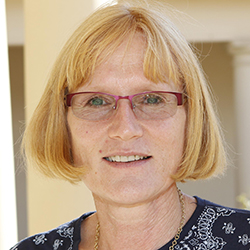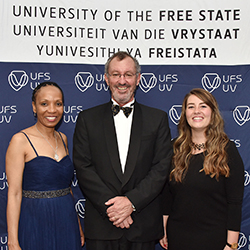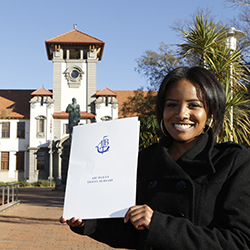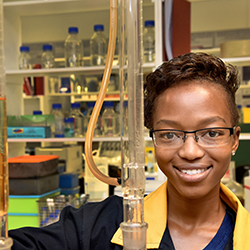Some other highlights:

The UFS was awarded five SARChI
(South African Research Chairs Initiative)
research chairs, the main goal of which is
to promote research excellence.
Read the full story

The UFS Chancellor’s Distinguished
Alumni Awards ceremony was held on
5 November 2016 on the
Bloemfontein Campus.
Read the full story

UFS student Candice Thikeson
completed a hat-trick of accolades when
she was named recipient of the Abe Bailey
Travel Bursary.
Read the full story

Reitumetse Maloa, a young researcher
at the UFS, is searching for a solution to
South Africa’s energy and electricity
problems from a rather unlikely
source: cow dung.
Read the full story
It was a year of various highlights for the University of the Free State (UFS) which has again illustrated the institution’s versatility by excelling on various fronts, from sports to research.
Some of these included Wayde van Niekerk winning a gold medal at the Olympic Games in Rio de Janeiro; research on the locomotion of the giraffe, and the awarding of honorary doctorates to people such as veteran journalist Max du Preez.
Van Niekerk breaks 400m world record
After his feat in Rio on 14 August 2016, Van Niekerk was described as “the next star” by former US sprinter Michael Johnson, whose 17-year-old 400m world record he broke in a time of 43,03. Johnson described the way in which the Kovsie outperformed the 400m field as “a massacre”.
Wayde van Niekerk was described as “the next star" by Michael Johnson, whose 17-year-old 400m world record he broke in a time of 43.03.
Max du Preez and Trevor Manuel honoured
Du Preez (Humanities) said he was excited about the young minds he had interacted with at the Winter Graduation ceremony of the UFS. The leading journalist and political analyst was one of four recipients of honorary doctorates from the university on June 30 2016. The others were Prof Joel Samoff (Humanities), former finance minister Trevor Manuel, and Dr Reuel Jethro Khoza (both Economic and Management Sciences.
Research of great value for conservation
Dr Francois Deacon, Department of Animal, Wildlife, and Grassland Sciences at the UFS, and Dr Chris Basu, a veterinarian at the Royal Veterinary College in the UK, conducted research on the manner in which giraffes locomote from one place to another.
Very little research has been done on the manner in which these animals move. The research will assist in understanding aspects such as the giraffe’s anatomy and function, as well as the energy it utilises in locomoting. Such information could help researchers understand where giraffes fit into the ecosystem and the data would be of great value for large-scale conservation efforts.
Read more on these highlights:
Wayde van Niekerk:
15 August 2016: Wayde the next big star, says Michael Johnson
20 September 2016: I don’t see myself as a star, says Wayde
27 October 2016: Wayde, Karla shine again at KovsieSport gala night
24 November 2016: Wayde keeps winning off the track
Honorary doctorates:
29 June 2016: UFS will award four honorary doctorates during Winter Graduation ceremonies
2 July 2016: Trevor Manuel and Max du Preez among the recipients of honorary doctorates at UFS graduation
Giraffe research:
9 March 2016: Giraffe research broadcast on National Geographic channel
23 August 2016: Research on locomotion of giraffes valuable for conservation of this species
18 November 2016: Studies to reveal correlation between terrain, energy use, and giraffe locomotion